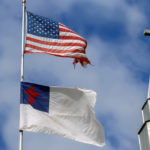Four Black professors from major universities and divinity schools found fault with the way some conservative white evangelicals have condemned critical race theory.
Critiques of critical race theory offered by certain white American evangelicals sound more like “parroting some shorthand stereotypical caricatures” than an honest assessment based on reading primary sources, said David Goatley, associate dean and director of the office of Black studies at Duke Divinity School.
‘The depth of intellectual bankruptcy’
“The critiques that I read sound to me as critiques coming from people who have not read the material, and I think that it is the depth of intellectual bankruptcy,” Goatley said.
Goatley and three other Black scholars delivered the online Walter B. and Kay W. Shurden Lectures on Religious Liberty and Separation of Church and State, sponsored by the Baptist Joint Committee for Religious Liberty.
During a question-and-answer session following their presentations, moderator Charles Watson Jr., director of education at the BJC, asked the lecturers how they deal with critical race theory in their classrooms and how they would respond to those who condemn it.
‘A control-the-population’ kind of action
Teresa Smallwood of Vanderbilt University Divinity School said the approach some conservative white Christians have taken toward critical race theory represents “the same illogic that would contend that Antifa was in charge of the Jan. 6 insurrection” in Washington, D.C.
“This is not a critical analysis. This is not an intellectual analysis at all,” Smallwood said.
Rather, it reflects what previously was known as “a dog whistle, but the dogs are all out now,” she said.
“This is a control-the-population kind of action: ‘Get your Negroes in line,’” she said.
Sign up for our weekly edition and get all our headlines in your inbox on Thursdays
When white Christians completely dismiss critical race theory, it demonstrates a “utilitarian ethic of ‘let’s do what’s going to make us happy,’” Smallwood asserted.
Honesty demands that Americans recognize the key role race has played, and having a critical theory that examines race is “imperative” to provide a framework for discussion and for shaping public policy, she insisted.
‘To think the United States is to think race’
Nicole Myers Turner of Yale University said critical race theory offers a way to help understand life outside one’s own perspective and experience.
“There is so much to be said for trying to understand the world not through your own eyes but through the eyes of someone else,” Turner said.
Anthony Pinn of Rice University succinctly summarized the importance of having a critical theory for exploring race: “To think the United States is to think race, and to deny that is to tell a lie.”
None of the participants specifically mentioned the Southern Baptist Convention’s Council of Seminary presidents, but the six presidents released a statement last November declaring critical race theory and intersectionality incompatible with the 2000 Baptist Faith & Message.
That sparked back-and-forth discussion with leaders of the SBC’s National African American Fellowship, and some prominent Black Baptist pastors announced their plans to leave the SBC due to the seminary presidents’ statement.
















We seek to connect God’s story and God’s people around the world. To learn more about God’s story, click here.
Send comments and feedback to Eric Black, our editor. For comments to be published, please specify “letter to the editor.” Maximum length for publication is 300 words.